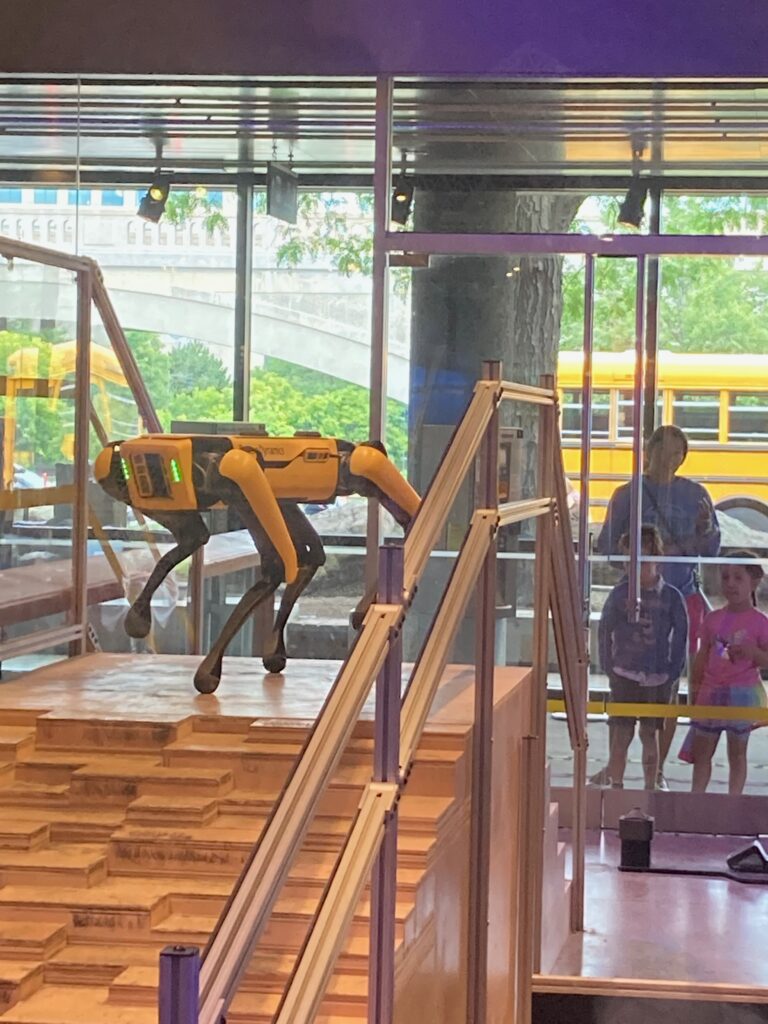
The dog stretched its legs, sniffed around, and laid down to rest. All totally normal dog things. Except this one was made of metal and settled itself into a charging station. All of the kids watching from outside a window cried “Awww!” They were crying in wonder of not just a dog, but a robot dog! How cool is that, right? Maybe.
Once I pulled the kids away from the window and bought tickets to get in the Boston Museum of Science (where we were), I discovered that the robot dog was part of a larger artificial intelligence (AI) exhibit. I talk a lot about using AI for science in work, so I was intrigued. How was the Museum of Science going to explain AI in a way that was interesting to non-scientists?
It was not exactly satisfying. Most of the exhibit was unadulterated “isn’t AI the coolest?!” hype. There was a whole kiosk about using AI for surveillance and policing without considering the ethics of it (which are very bad). The fact that the cute AI dog is being used by police – with all of the problems inherent in policing – went completely unmentioned. There was a corner at the very end that was easy to walk by about the ethics of AI, but most of it was about AI art and text. There was no mention of the possiblity of it being abused by people in authority.
Since the exhibit lacked that information, I filled in some of the details for my kids. I encouraged them to question the captions and think about what wasn’t being said in addition to what was. They know I love science – sharing cool science stuff is my day job – so they knew it wasn’t a matter of me being a luddite. It was more a matter of thinking for yourself about everything, including technology.
We say we want our kids to think for themselves, yet often parents or teachers shush or even punish kids when they question how things are done. Or even if we aren’t quite so explicit about it, we don’t model that questioning for them. We accept what we’re told too easily, especially when someone in authority provides the information.
But that’s how injustices sneak by well-meaning people. They hide in the guise of avoiding discomfort, like “this is too hard for little kids to learn about. Let little kids be little kids.” Or complexity, saying, “this is too complicated to explain and involves too much context.” Or even cuteness, like robot dogs that police use because they can be more vicious and obedient than real dogs.
Instead, I want my kids to question what they’re learning, at school and elsewhere. To think about who wrote the history. To think about who was in power when it was being written and who chose it to be taught. To think about who is highlighted and who is left out. To consider what perspectives those teaching or educational materials reflect.
In an age when groups like Moms for Liberty are pulling books from school libraries and alt-right groups are recruting YouTube gamers as mouthpieces, this thoughtful skepticism is more important than ever. It doesn’t mean embracing the “I’ve done my own research!” nonsense that rejects solid science. It means being conscious of what you are taking in and considering if it reflects a version of the truth that’s incomplete or skewed.
In some cases, this may lead the kids to be kind of a pain in the butt at times. I know a couple teachers who didn’t particularly like me in high school because I would question the accuracy of answers on multiple-choice tests. It wasn’t that I wanted a higher grade – I just wanted the answers to be clear and *correct* for everyone. It doesn’t make things easier at home either! Constant negotiations from my kids about bedtime lead me to joke that when they get older, they should intern with my friends who are lawyers.
But despite the challenge that these traits cause now, they’ll serve my kids and other kids well in the long-run. We need thoughtful citizens and we start by raising them today.